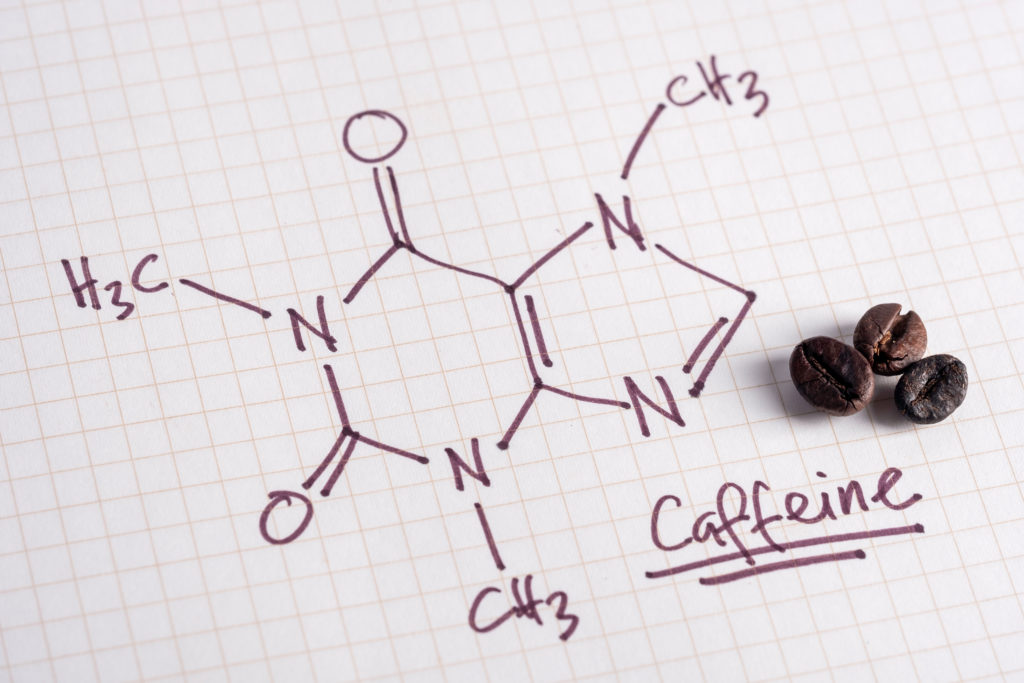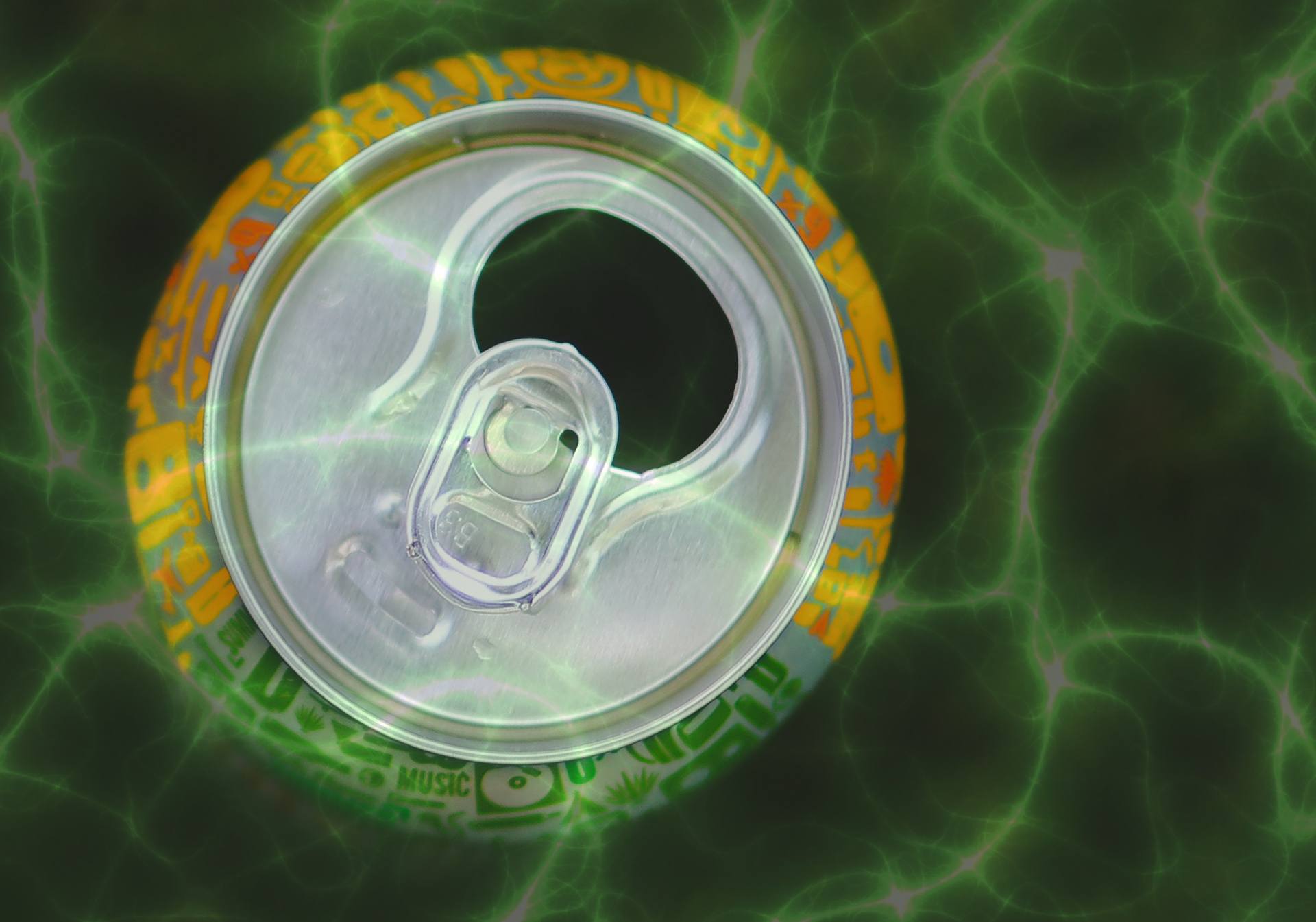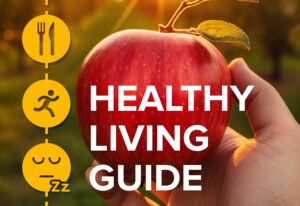

Many of us can’t imagine starting the day without a cup of coffee. One reason may be that it supplies us with a jolt of caffeine, a mild stimulant to the central nervous system that quickly boosts our alertness and energy levels. [1] Of course, coffee is not the only caffeine-containing beverage. Read on to learn more about sources of caffeine, and a review of the research on this stimulant and health.
The chemical name for the bitter white powder known as caffeine is 1,3,7 trimethylxanthine. Caffeine is absorbed within about 45 minutes after consuming, and peaks in the blood anywhere from 15 minutes to 2 hours. [2] Caffeine in beverages such as coffee, tea, and soda is quickly absorbed in the gut and dissolves in both the body’s water and fat molecules. It is able to cross into the brain. Food or food components, such as fibers, in the gut can delay how quickly caffeine in the blood peaks. Therefore, drinking your morning coffee on an empty stomach might give you a quicker energy boost than if you drank it while eating breakfast.
Caffeine is broken down mainly in the liver. It can remain in the blood anywhere from 1.5 to 9.5 hours, depending on various factors. [2] Smoking speeds up the breakdown of caffeine, whereas pregnancy and oral contraceptives can slow the breakdown. During the third trimester of pregnancy, caffeine can remain in the body for up to 15 hours. [3]
People often develop a “caffeine tolerance” when taken regularly, which can reduce its stimulant effects unless a higher amount is consumed. When suddenly stopping all caffeine, withdrawal symptoms often follow such as irritability, headache, agitation, depressed mood, and fatigue. The symptoms are strongest within a few days after stopping caffeine, but tend to subside after about one week. [3] Tapering the amount gradually may help to reduce side effects.
Caffeine is naturally found in the fruit, leaves, and beans of coffee, cacao, and guarana plants. It is also added to beverages and supplements. There is a risk of drinking excess amounts of caffeinated beverages like soda and energy drinks because they are taken chilled and are easy to digest quickly in large quantities.
In the U.S., adults consume an average of 135 mg of caffeine daily, or the amount in 1.5 cups of coffee (1 cup = 8 ounces). [5] The U.S. Food and Drug Administration considers 400 milligrams (about 4 cups brewed coffee) a safe amount of caffeine for healthy adults to consume daily. However, pregnant women should limit their caffeine intake to 200 mg a day (about 2 cups brewed coffee), according to the American College of Obstetricians and Gynecologists.
The American Academy of Pediatrics suggests that children under age 12 should not consume any food or beverages with caffeine. For adolescents 12 and older, caffeine intake should be limited to no more than 100 mg daily. This is the amount in two or three 12-ounce cans of cola soda.
Caffeine is associated with several health conditions. People have different tolerances and responses to caffeine, partly due to genetic differences. Consuming caffeine regularly, such as drinking a cup of coffee every day, can promote caffeine tolerance in some people so that the side effects from caffeine may decrease over time. Although we tend to associate caffeine most often with coffee or tea, the research below focuses mainly on the health effects of caffeine itself. Visit our features on coffee, tea, and energy drinks for more health information related to those beverages.
Caffeine can block the effects of the hormone adenosine, which is responsible for deep sleep. Caffeine binds to adenosine receptors in the brain, which not only lowers adenosine levels but also increases or decreases other hormones that affect sleep, including dopamine, serotonin, norepinephrine, and GABA. [2] Levels of melatonin, another hormone promoting sleep, can drop in the presence of caffeine as both are metabolized in the liver. Caffeine intake later in the day close to bedtime can interfere with good sleep quality. Although developing a caffeine tolerance by taking caffeine regularly over time may lower its disruptive effects, [1] those who have trouble sleeping may consider minimizing caffeine intake later in the day and before going to bed.
In sensitive individuals, caffeine can increase anxiety at doses of 400 mg or more a day (about 4 cups of brewed coffee). High amounts of caffeine may cause nervousness and speed up heart rate, symptoms that are also felt during an anxiety attack. Those who have an underlying anxiety or panic disorder are especially at risk of overstimulation when overloading on caffeine.
Cardiovascular diseaseCaffeine stimulates the heart, increases blood flow, and increases blood pressure temporarily, particularly in people who do not usually consume caffeine. However, strong negative effects of caffeine on blood pressure have not been found in clinical trials, even in people with hypertension, and cohort studies have not found that coffee drinking is associated with a higher risk of hypertension. Studies also do not show an association of caffeine intake and atrial fibrillation (abnormal heart beat), heart disease, or stroke. [3]
Weight managementCaffeine is often added to weight loss supplements to help “burn calories.” There is no evidence that caffeine causes significant weight loss. It may help to boost energy if one is feeling fatigued from restricting caloric intake, and may reduce appetite temporarily. Caffeine stimulates the sympathetic nervous system, which plays a role in suppressing hunger, enhancing satiety, and increasing the breakdown of fat cells to be used for energy. [6] Cohort studies following large groups of people suggest that a higher caffeine intake is associated with slightly lower rates of weight gain in the long term. [3] However, a fairly large amount of caffeine (equivalent to 6 cups of coffee a day) may be needed to achieve a modest increase in calorie “burn.” Additional calories obtained from cream, milk, or sweetener added to a caffeinated beverage like coffee or tea can easily negate any calorie deficit caused by caffeine.
Pregnancy and infertilityCaffeine can cross the placenta, and both mother and fetus metabolize caffeine slowly. A high intake of caffeine by the mother can lead to prolonged high caffeine blood levels in the fetus. Reduced blood flow and oxygen levels may result, increasing the risk of miscarriage and low birth weight. [3] However, lower intakes of caffeine have not been found harmful during pregnancy when limiting intakes to no more than 200 mg a day. A review of controlled clinical studies found that caffeine intake, whether low, medium, or high doses, did not appear to increase the risk of infertility. [7]
Liver diseaseMost studies on liver disease and caffeine have specifically examined coffee intake. Caffeinated coffee intake is associated with a lower risk of liver cancer, fibrosis, and cirrhosis. Caffeine may prevent the fibrosis (scarring) of liver tissue by blocking adenosine, which is responsible for the production of collagen that is used to build scar tissue. [3]
GallstonesStudies have shown that higher coffee consumption is associated with a lower risk of gallstones. [8] Decaffeinated coffee does not show as strong a connection as caffeinated coffee. Therefore, it is likely that caffeine contributes significantly to this protective effect. The gallbladder is an organ that produces bile to help break down fats; consuming a very high fat diet requires more bile, which can strain the gallbladder and increase the risk of gallstones. It is believed that caffeine may help to stimulate contractions in the gallbladder and increase the secretion of cholecystokinin, a hormone that speeds the digestion of fats.
Neurological diseaseCaffeine may protect against Parkinson’s disease. Animal studies show a protective effect of caffeine from deterioration in the brain. [3] Prospective cohort studies show a strong association of people with higher caffeine intakes and a lower risk of developing Parkinson’s disease. [9]
Caffeine has a similar action to the medication theophylline, which is sometimes prescribed to treat asthma. They both relax the smooth muscles of the lungs and open up bronchial tubes, which can improve breathing. The optimal amount of caffeine needs more study, but the trials reviewed revealed that even a lower caffeine dose of 5 mg/kg of body weight showed benefit over a placebo. [10] Caffeine has also been used to treat breathing difficulties in premature infants. [3]
Caffeine stimulates the release of a stress hormone called epinephrine, which causes liver and muscle tissue to release its stored glucose into the bloodstream, temporarily raising blood glucose levels. However, regular caffeine intake is not associated with an increased risk of diabetes. In fact, cohort studies show that regular coffee intake is associated with a lower risk of type 2 diabetes, though the effect may be from the coffee plant compounds rather than caffeine itself, as decaffeinated coffee shows a similar protective effect. [3] Other observational studies suggest that caffeine may protect and preserve the function of beta cells in the pancreas, which are responsible for secreting insulin. [11]
Caffeine toxicity has been observed with intakes of 1.2 grams or more in one dose. Consuming 10-14 grams at one time is believed to be fatal. Caffeine intake up to 10 grams has caused convulsions and vomiting, but recovery is possible in about 6 hours. Side effects at lower doses of 1 gram include restlessness, irritability, nervousness, vomiting, rapid heart rate, and tremors.
Toxicity is generally not seen when drinking caffeinated beverages because a very large amount would need to be taken within a few hours to reach a toxic level (10 gm of caffeine is equal to about 100 cups of brewed coffee). Dangerous blood levels are more often seen with overuse of caffeine pills or tablets. [3]

Coffee lovers around the world who reach for their morning brew probably aren’t thinking about its health benefits or risks. And yet this beverage has been subject to a long history of debate.

Many energy drinks pack about 200 mg of caffeine, the amount in two cups of brewed coffee. Because of the amount of sugar and stimulant ingredients, there is concern that these beverages may not be helpful, and even worse, harmful to adolescents and people with certain health conditions.
Last reviewed July 2020
The contents of this website are for educational purposes and are not intended to offer personal medical advice. You should seek the advice of your physician or other qualified health provider with any questions you may have regarding a medical condition. Never disregard professional medical advice or delay in seeking it because of something you have read on this website. The Nutrition Source does not recommend or endorse any products.
Use healthy oils (like olive and canola oil) for cooking, on salad, and at the table. Limit butter. Avoid trans fat.
Drink water, tea, or coffee (with little or no sugar). Limit milk/dairy (1-2 servings/day) and juice (1 small glass/day). Avoid sugary drinks.
The more veggies — and the greater the variety — the better. Potatoes and French fries don’t count.
Eat plenty of fruits of all colors
Choose fish, poultry, beans, and nuts; limit red meat and cheese; avoid bacon, cold cuts, and other processed meats.
Eat a variety of whole grains (like whole-wheat bread, whole-grain pasta, and brown rice). Limit refined grains (like white rice and white bread).
Incorporate physical activity into your daily routine.
Thank you for supporting our mission of translating food and nutrition knowledge into daily practice!
Make a gift
A monthly update filled with nutrition news and tips from Harvard experts—all designed to help you eat healthier. Sign up here.

Explore the downloadable guide with tips and strategies for healthy eating and healthy living.